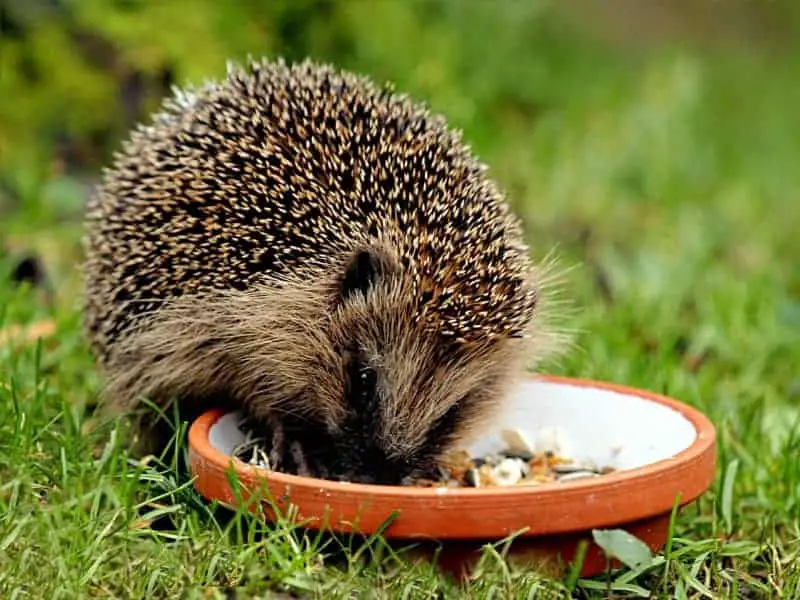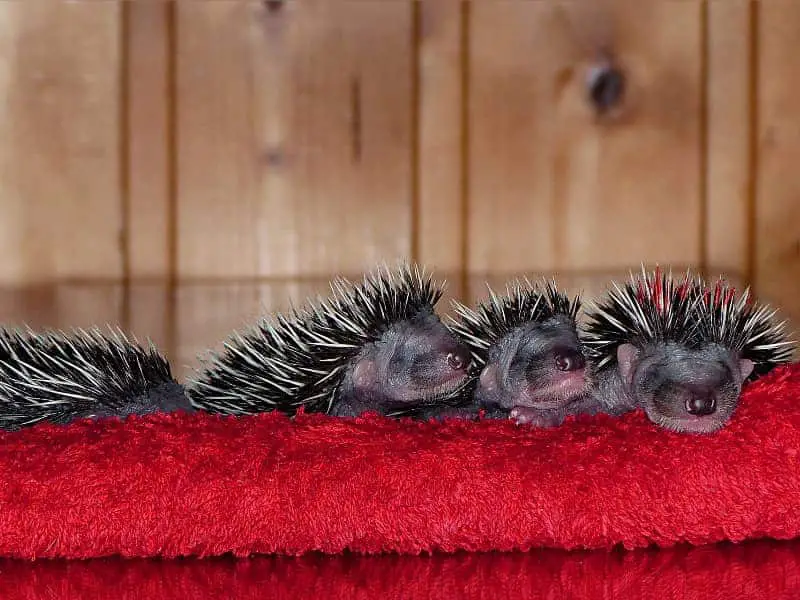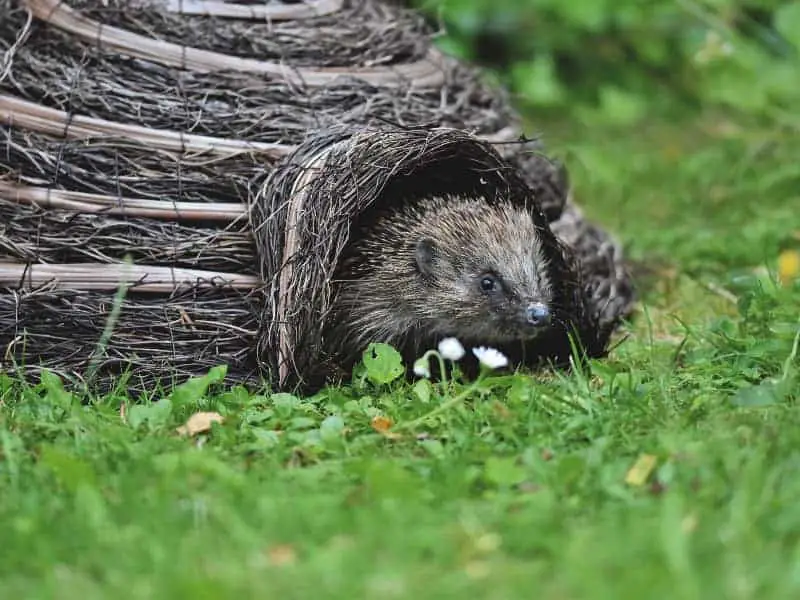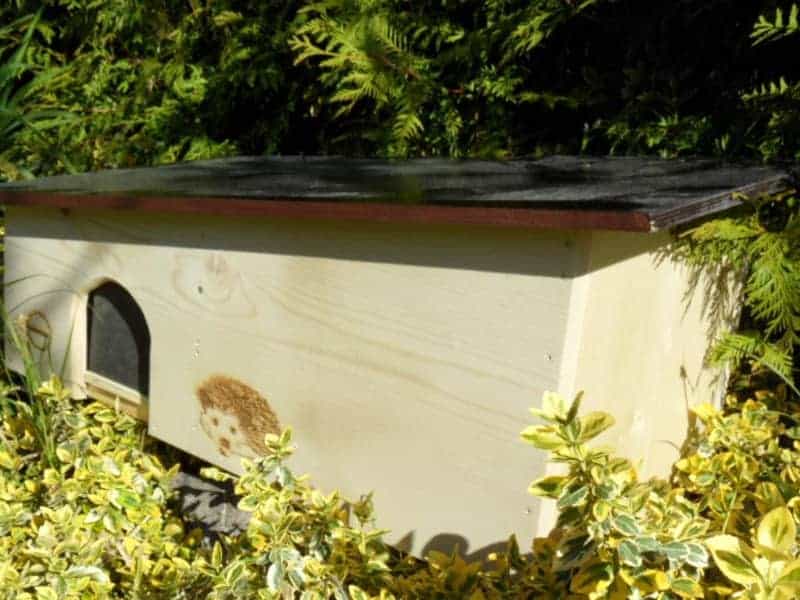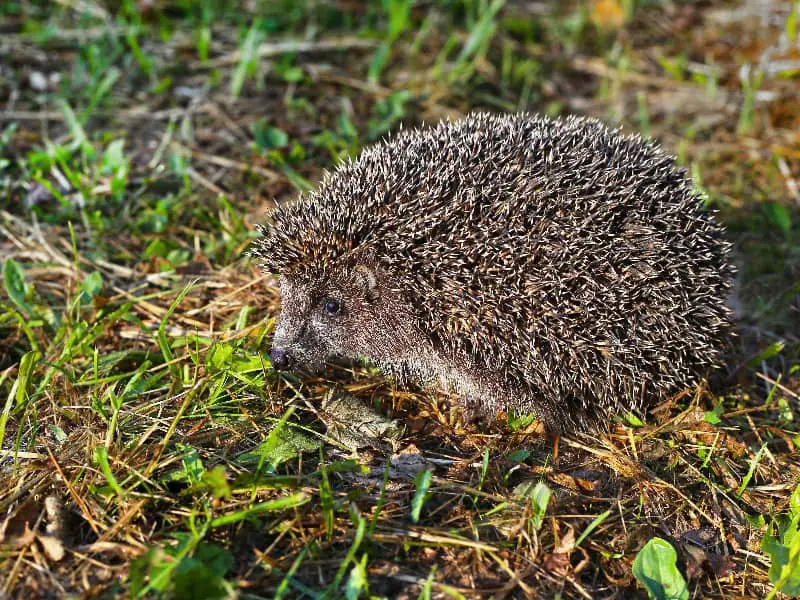
Can hedgehogs bite?
The question: "Can hedgehogs bite?", is more than just a trivial idea. It is particularly relevant for animal lovers, garden owners and parents who want to teach their children about nature.
- Can hedgehogs bite?
The general perception of hedgehogs
Hedgehogs generally enjoy quite a positive reputation. They are regarded as useful animals that rid the garden of pests and as cute, prickly creatures that occasionally cross our path in autumn. But hardly anyone thinks about whether these seemingly harmless animals can also bite.
Actually hedgehogs are solitary animals, which are rather shy and avoid people. Since they are not predators hunting for prey, there is usually no immediate danger from them. Nevertheless, the question arises whether hedgehogs can bite, especially considering that more and more people have the desire to settle a hedgehog in their own garden or even take it into care.
Why is the question "Can hedgehogs bite?" relevant?
This question is relevant insofar as the interaction between hedgehogs and humans is constantly increasing. Be it through the increasing number of garden owners who want to provide a home for the little spiny animals or through parents who want to bring nature closer to their children.
It is important to be well informed in order to avoid unnecessary risks and at the same time not to cause stress to the animal. Ignorance in this area can lead to injuries on both sides. Adequate education is therefore essential, and this blogpost is intended to help shed light on the subject.
Can hedgehogs bite? - The hedgehog bite
The anatomy of a hedgehog is fascinating and diverse, making it a unique member of the animal kingdom. In the specific context of biting behavior, it is important to take a look at the hedgehog's dentition.
Tooth structure
The tooth structure of a hedgehog is designed to be used mainly for crushing insects, worms and smaller animals. The teeth are rather small and not designed to capture large prey or to chew intensively.
The front teeth, known as incisors, are pointed and are suitable for grasping and holding food. The molars are flatter and are used for grinding food. Since hedgehogs are not carnivores in the classic sense, their teeth are not as pronounced as those of carnivores, which significantly reduces biting pressure.
Jaw force
The jaw strength of a hedgehog is not particularly strong compared to other animals. It is sufficient to crush insects, worms and other small animals, but not strong enough to cause serious damage should a hedgehog bite.
However, one should not make the mistake of underestimating the hedgehog. A bite can be painful and should be understood as a warning signal that the hedgehog feels threatened. If you are in this situation, it is advisable to let go of the hedgehog immediately and give it space.
Biting behavior
Hedgehogs are rather reserved and shy by nature. Biting behavior is rare among them and usually only occurs when they feel cornered or threatened. In such cases, they may bite to defend themselves.
Biting behavior varies from hedgehog to hedgehog and can also be influenced by various factors, such as stress or illness. In general, the probability of being bitten by a hedgehog is rather low, but not zero.
Can hedgehogs bite? - Hedgehogs natural behavior
If we understand the natural behavior of a hedgehog, we can better assess under what circumstances it might bite. In the following, we will discuss feeding behavior, social interactions, and responses to threats.
Feeding behavior
Hedgehogs are nocturnal animals that go in search of food at dusk and during the night. Their main diet consists of insects, worms, snails and other small animals. Occasionally they also eat fruits and plants, but animal food has priority.
To catch their prey, hedgehogs use their pointed snouts and their small but effective teeth. They are not hunters in the classic sense, but rather gatherers. They sniff the ground and dig to find their food. Thus, their biting behavior when eating is more focused on crushing small prey and less on attacking larger animals.
Social behavior
Hedgehogs are solitary animals by nature. Outside the mating season, they hardly seek contact with conspecifics and even defend their territory quite vigorously. Since they do not live in social structures, there is also no pronounced social biting behavior as in some other animals.
However, during the mating season, fights between males may occur, including biting. However, these bites are more a means of communication and self-expression than an attempt to seriously injure the opponent.
Response to threats
A hedgehog's first reaction to a threat is usually to curl up and use its spines to defend itself. A bite tends to be the last option and is only used when the hedgehog sees no other choice. This is a self-defense reaction to protect itself from predators or other threats.
Even in this situation, the probability of being bitten is rather low. However, you should know that it is possible, especially if the hedgehog feels extremely threatened or sees no way to escape.
How hedgehogs interact with humans
Hedgehog-human interactions have increased in recent years, especially in urban and rural areas where gardens and parks have become hedgehog habitats. This section discusses the different scenarios in which hedgehogs and humans might encounter each other.
In the wilderness
In the wild, hedgehogs are rather shy and avoid contact with humans. When they sense human presence, their first reaction is usually to curl up or hide in a hiding place. In this context, the likelihood of a hedgehog biting is very low, as the animal will usually try to move away or hide.
It is therefore important for hikers and nature lovers to be respectful and cautious when encountering a hedgehog in the wild. Scaring the animal or entering its habitat could cause stress, which could increase the likelihood of a bite, even if it remains low.
With direct contact
Sometimes the situation arises where you have to touch or pick up a hedgehog directly, for example if it is injured or in a dangerous situation. In such cases special care is needed. A stressed or frightened hedgehog might bite as a defensive reaction.
Wearing gloves and lifting the animal calmly and carefully can help minimize stress to the hedgehog and reduce the likelihood of a bite. It is also advisable to hold the animal for only as short a time as possible and then move it to a safe place or seek professional help.
In the garden
In the garden, hedgehogs are often welcome guests, as they help with pest control. In this case, the interaction is often indirect and limited to creating a pleasant environment for the hedgehog by providing food or shelter.
Since the hedgehog is not directly threatened in this situation and feels relatively safe in the garden, the probability of a bite is low. However, if you want to observe the hedgehog up close or even touch it, you should take the same precautions as for direct contact to minimize stress and thus the possibility of a bite.
Can hedgehogs bite? - Encounters with pets
Pets such as dogs and cats can come into contact with hedgehogs, especially if they live in an area where hedgehogs are present. These encounters are not always unproblematic and require special attention from pet owners.
Interaction with dogs and cats
Dogs are often curious and may be tempted to sniff or even nudge a hedgehog. Most hedgehogs will curl up in such an encounter to protect themselves with their spines. As a rule, a hedgehog will not attempt to bite a larger animal such as a dog or cat unless it feels extremely threatened.
Cats are usually more cautious and keep more distance from hedgehogs. They often observe from a distance and rarely attack, as the hedgehog's spines are an effective defense mechanism. Again, the risk of a bite from the hedgehog is rather low, but not impossible.
Risks and precautions
For dogs, there is a risk of injuring themselves on the hedgehog's spines if they are too curious or pushy. Therefore, it is important to keep an eye on the animal and intervene if necessary. Cats are usually smarter when it comes to handling hedgehogs, but owners should be vigilant here as well.
Because a hedgehog might bite if cornered or extremely stressed, it is advisable to keep pets away from hedgehogs. However, if a pet does interact with a hedgehog, it is important to quickly and calmly assess the situation and take appropriate action to avoid stress or injury to all involved.
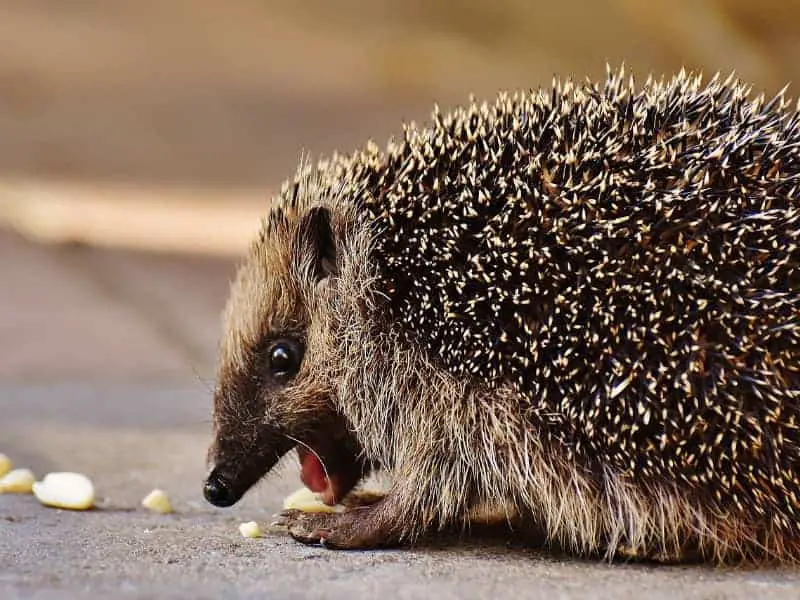
First aid after a bite
Although the probability is low, it may happen that a hedgehog bites. In such cases, it is important to know how best to care for yourself or your pet.
What to do?
In the event of a hedgehog bite, the affected area should be cleaned immediately with soap and warm water. This will minimize the risk of infection. It is advisable to then disinfect the wound with an antiseptic agent and apply a plaster or bandage.
If the bite is deeper or causes severe bleeding, it is important to see a doctor or veterinarian. Likewise, it may be wise to check the tetanus vaccination status and get a booster if necessary.
Risk of infection
Hedgehogs can be carriers of bacteria that can cause infection. Although the risk is rather small, it should not be ignored. Symptoms of infection could be redness, swelling or persistent pain around the wound. If such symptoms occur, it is advisable to seek medical advice.
Medical care
In some cases, professional medical care might be necessary. This is especially the case if the bite is deep, causes heavy bleeding, or shows signs of infection. A doctor will examine the wound, possibly stitch it up, and prescribe antibiotics if the risk of infection is considered high. For pets, a veterinarian should be consulted to ensure the best possible treatment.
Why do hedgehogs bite?
A hedgehog bite is rare, but when it does occur, there is usually a reason. This section looks at the various factors that might cause a hedgehog to bite.
Stressors
Hedgehogs are naturally rather shy animals and prefer to avoid confrontation. However, they can become stressed if they feel threatened or cornered. In such cases, their natural flight instinct may be overcome and they may bite as a last resort of defense.
If you have a hedgehog in your garden or are caring for an injured animal, you should always take care to keep the stress for the animal as low as possible. Quick movements or loud noises should be avoided to minimize the risk of a bite.
Diseases
Illness can greatly affect a hedgehog's behavior, making it unpredictable or aggressive. A sick hedgehog might be more inclined to bite if it feels threatened. However, the presence of disease is often difficult to detect, so caution should always be used if you think a hedgehog is not healthy.
Defense mechanisms
A hedgehog's spines are its primary defense mechanism. Biting is usually the last defense strategy a hedgehog uses. However, there may be times when the hedgehog feels so threatened that it uses this last defense option. Biting is a sort of "last resort" for the hedgehog, and it usually only happens when it sees no other way to escape or defend itself.
Conclusion: Can hedgehogs bite?
Hedgehogs are fascinating creatures that usually defend themselves by rolling and using their spines. The likelihood of a hedgehog biting is relatively low, but not completely impossible. As a rule, a hedgehog will only bite if it feels extremely threatened or cornered. Stress, disease and special situations, such as encounters with pets, can affect this behavior.
It is important for humans and pets to treat hedgehogs with respect and care. If a bite does occur, quick and proper first aid is critical. This may include cleaning and disinfecting the wound and visiting a doctor or veterinarian, especially if signs of infection appear.
By being aware of these potential risks and behaviors, you can ensure that your encounter with a hedgehog is as safe and stress-free as possible for everyone involved.
FAQ: Can hedgehogs bite?
Do hedgehogs bite people?
Hedgehogs are usually shy animals and try to avoid people. However, if they are extremely stressed or threatened, they might bite.
What is the risk of being bitten by a hedgehog?
The risk is generally very low. Hedgehogs use their spines as a primary defense mechanism and bite only as a last resort.
What should I do if I was bitten by a hedgehog?
The wound should be cleaned immediately with soap and warm water. Afterwards, it is advisable to treat the wound with an antiseptic agent and consult a doctor, especially if the bite is deep or shows signs of infection.
Can hedgehogs transmit diseases?
Although the risk is low, hedgehogs can be carriers of bacteria. Therefore, it is important to properly care for the wound and seek medical advice if necessary.
How should I react if my pet encounters a hedgehog?
As a rule, hedgehogs curl up when they are in danger. Keep your pet away from the hedgehog and observe the situation. If your pet has bitten or interacted with the hedgehog, it is advisable to consult a veterinarian.
Are hedgehogs aggressive?
Hedgehogs are not aggressive, but rather shy and reserved. If they bite, it is usually out of fear or stress, not aggression.
What are the most common reasons why a hedgehog might bite?
The most common reasons are stress, illness and the feeling of being cornered. Biting is usually the last option for the hedgehog when all other defense mechanisms have failed.
Author

-
Garden animal - A life with nature
Welcome to my animal blog! My name is Dirk and I am happy to take you on my journey through the fascinating world of animals and gardening.
Born 54 years ago, I have had an insatiable curiosity for the animal world around me since childhood. Although I have moved professionally in other industries, my true passion has always been animals and nature. It is remarkable how a small garden has become such an important part of my life.
Many of my fondest memories are associated with the animals that share our home. Whether it's the curious squirrels that scurry across the trees in the morning, the colorful variety of birds that visit our feeders, or the busy bees and butterflies that pollinate our flowers, every moment with them is invaluable to me.
This blog is my contribution to share my experiences, discoveries and insights with like-minded people. Here I will share stories of unforgettable encounters with animals, give tips on gardening and creating wildlife-friendly habitats, and take you on my journeys through nature.
Thank you so much for being here!
Cordial,
Dirk aka garden animal
Last posts
- 27. February 2024PetsVeganes Hundefutter – Grün und Gesund?
- 18. January 2024ChickensOregano für Hühner
- November 27, 2023HamsterDiurnal hamsters
- November 24, 2023HamsterHamster hammock

